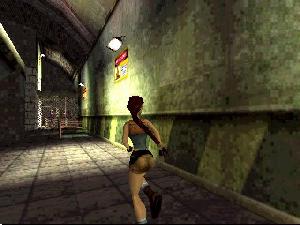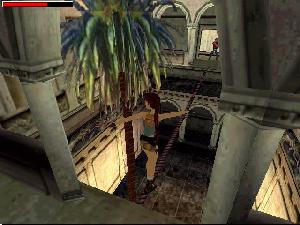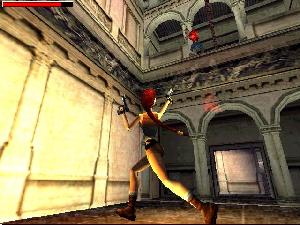Haven’t I seen you somewhere before?
Let’s face it, Lara Croft is an animal-hating, wealthy English treasure hunter
who “acquires” artifacts for no reason other than hoarding them. As Indiana
Jones’ battlecry was always “That belongs in a museum!” Lara’s battlecry must
be “That belongs in my curio cabinet!” And for all the actual archaeological
emphasis in the game series (i.e. none), Lara might just as well be running
all over the world searching for distinctive Hummel
figurines. However, in terms of gaming, Lara is the Harriet Tubman of 3D
adventurers, the Albert
Schweitzer of the polygonal world. Aside from a criminal sense of fashion
and a bad head-to-body ratio, her worst sin has been appearing in a series of
lackluster games.
Well, Lara has returned for yet another mediocre sally onto the screen in Tomb
Raider: Chronicles. Having disappeared at the end of the previous TR game,
The Last Revelation, Lara is feared dead. Her friends gather in her mansion
and swap stories of Lara’s exploits. It’s kind of like that episode of Three’s
Company where they get stuck in a walk-in refrigerator and reminisce
for a half-hour with flashbacks to old episodes. But in this case, the episodes
aren’t old and they’re not particularly memorable, either. The Tomb Raider
series has never had much in the way of story and apparently the folks at Core
have no plans of breaking with this tradition.
Another Tomb Raider tradition is that of lengthiness, often in the bad
way. In a departure move, Chronicles is the shortest quintuplet in the
series, though not a significantly prettier one. That’s the thing about quintuplets,
they have the same general look about them. Changes are, for the most part,
slight.
The series’ more recent games have moved away from focus on the antique world
to more contemporary settings. Chronicles continues with this trend.
Although at times this game is graphically evocative of Fear
Effect, the graphics are better suited to depictions of ancient architecture.
No matter how you cut it, a mysterious temple will always look more interesting
than an urban rooftop.
The rare FMV action sequences look curiously dated. Although they’ve done their
best to shove Lara off on us as some incredible action impresario, they have
her moving like Captain
Scarlet…and that’s not a good thing.
It’s never a positive sign when the number for the 99-cents-per-minute help
line is featured prominently on the game case. It usually means you’re going
to need it. TR games are notorious for their reliance on lock-and-key
puzzles, which cry out for a strategy guide or a Vulcan Mind-Meld with the game
designer.
Opening as many locked doors as possible is, as always, Lara’s primary objective.
Although the puzzles in Chronicles are much less obscure than the ones
in TR3 and don’t require as much running back
and forth as in Last Revelation, there are still moments of frustration
that can stretch into hours of tedium. For example, a player could scour every
corner of an area searching for a key to open a padlock until they are about
ready to tear their hair out. Why? There is no key. You just use the laser sight
you can equip to your revolver and you shoot the lock out. Nothing in previous
TR games would lead you to believe that locks even co-exist on the same
of level of reality as your weaponry, let alone allowing the two objects to
interact.
Chronicles does incorporate more movement-based puzzles than its predecessors.
Fewer and shorter levels help to prevent areas from getting too familiar. Her
travel itinerary for this junket includes Rome, a Russian base, an island off
the coast of Ireland and a futuristic city.
 TR
TR
has always suffered from unconvincing opposition, just a bunch of endangered
animal species with scores to settle and a couple of bad guys so inept they
rely on village idiots for henchmen. This improved greatly in The Last Revelation,
which featured skeleton warriors who were relatively agile and persistent. However,
in Chronicles there are still long stretches between enemies and the
enemies which exist in this evacuated world haven’t gotten any smarter.
A few have compensated for this in the cheap way – by increasing the amount
of damage they do and requiring a headshot to take them down. Enemies do not
do much in the way of evasive action, they still allow themselves to be peppered
with bullets with no indication that they’re being hit other than small red
flecks flying off of them. When they’ve had enough, they simply roll over and
vanish.
There are a few improvements and added features to the game. Now Lara doesn’t
have to be cardinally aligned to switches and pick-ups, but will usually move
towards the interactive object as long as she is within proximity. Lara can
now walk a tightrope, although she does this very slowly and will not fire a
weapon nor allow any loud talking while performing this new stunt. She has also
gained a nifty grappling hook gun and a chloroform attack, but neither of these
things are always available nor are they in every episode.
In the Black Isle chapter, you play Lara as a teenager. She is unarmed during
this phase of the game and must evade enemies, a refreshing change from perforating
everything that moves. This is a little different for Lara, but not by much.
Usually there is a point during every TR game where Lara becomes unarmed,
and this chapter serves that purpose.
Although the game is severely challenged conceptually and lacks a decent or
even coherent story, it is redeemed by its attempt at varied and balanced play
and the fact that, compared to its siblings, it’s shorter than a legless dwarf
caterpillar after a confrontation with the business end of a shoe. Despite the
key chasing, uninteresting environments, masochistic enemies, and an unwillingness
to break with certain asinine gameplay traditions, Tomb Raider: Chronicles
is perhaps the liveliest of a weak line of sequels. The trouble is, it’s the
fifth one, and it’s long past the time to stop.

-
It's shorter
-
More varied gameplay
-
Barely
-
Nonexistent story
-
Tedious seek-the-key puzzles
-
Vulcan Mind-Melds are not energy efficient











